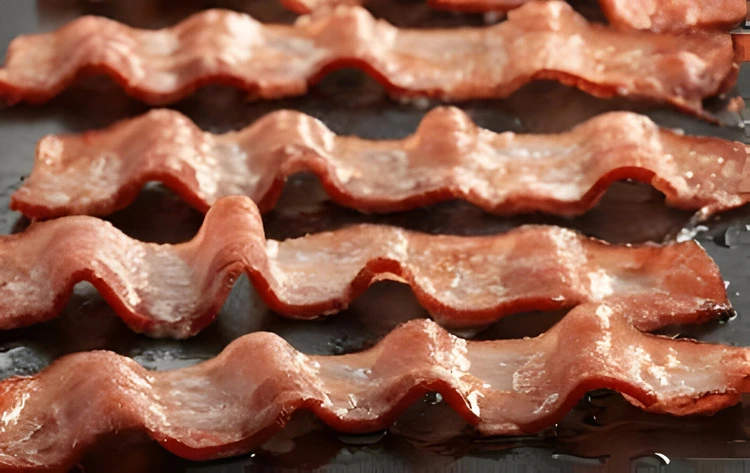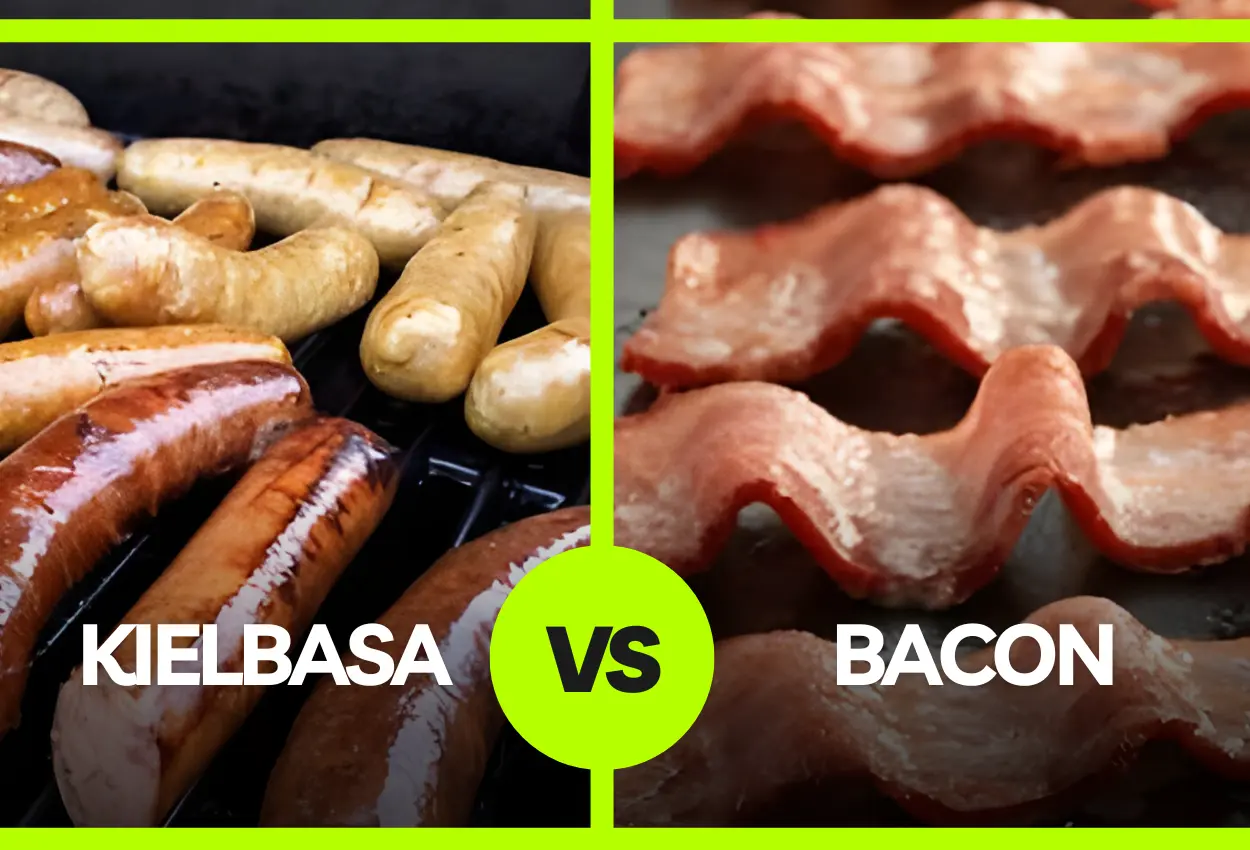Is kielbasa healthier than bacon? We delve into the nutritional battleground, exploring fat, protein, sodium, and more. Discover the “healthier” choice for your next breakfast (or any meal)!
Kielbasa vs. Bacon Fight Club
- Calories: Bacon wins (slightly!)
- Fat: Kielbasa takes the crown (less overall and saturated fat)
- Protein: Both are champions
- Sodium: Draw (both high, choose low-sodium options)
- Winner: You decide! Choose based on your needs and preferences.
Table of contents
Both are breakfast staples, but is kielbasa healthier than bacon? This age-old question has divided breakfast enthusiasts for years.
Unveiling the Healthier Choice – Kielbasa vs. Bacon
Do you ever find yourself staring at the breakfast aisle, torn between the smoky allure of bacon and the hearty appeal of kielbasa? Both are classic breakfast staples, but is kielbasa healthier than bacon?
This age-old question has divided breakfast enthusiasts for years. As a passionate chef and health advocate, I’ve delved deep into the nutritional profiles of both types of meat to uncover the truth about which option might be a better fit for your plate.
In my family, both kielbasa and bacon hold a special place. My grandmother’s kielbasa and cabbage dish was a Sunday tradition, bursting with savory flavors. But on busy mornings, bacon’s quick-cooking convenience often reigned supreme.
So, understanding the nuanced nutritional differences between these two meats mattered to me, both personally and professionally.
But before we dissect the numbers, so, let’s explore the unique characteristics of each meat. Kielbasa, a Polish sausage, typically boasts a robust, garlicky flavor.
Bacon, on the other hand, offers a smoky and salty appeal. Both can be enjoyed in various ways, from breakfast scrambles to hearty stews.
So, which one deserves the “healthier” crown? Stay tuned as we embark on a nutritional breakdown of both contenders, uncovering their strengths and weaknesses, and ultimately helping you make informed choices for your next breakfast (or any meal) adventure!
Did you know that the World Health Organization (WHO) recommends limiting daily sodium intake to less than 2 grams? We’ll be diving into the sodium content of both meats later on.
In the meantime, feel free to share your favorite ways to enjoy kielbasa and bacon in the comments below! Let’s spark some friendly breakfast inspiration while we explore the science behind these beloved meats.
Nutritional Breakdown: Is Kielbasa Healthier Than Bacon?
Now, we delve deep into the Kielbasa vs. Bacon debate, unveiling the truth about their nutritional profiles. We’ll compare factors like fat content, protein, sodium, and more, helping you make informed choices for a healthier and delicious breakfast (or any meal)!
So, let’s get down to brass tacks and delve into the nutritional battleground! But before we declare a winner, remember, that individual dietary needs and preferences play a crucial role.
Calorie and Fat Content:
- One serving of kielbasa (50g) typically packs around 170 calories, while a similar serving of bacon clocks in at about 140 calories. So, bacon seems to have a slight edge in terms of calorie count.
- However, the story thickens when it comes to fat. Kielbasa generally boasts less total fat (around 10g) compared to bacon (around 12g). Importantly, kielbasa contains less saturated fat (3g) than bacon (5g).
Saturated fat is a type of fat linked to increased cholesterol levels, so kielbasa might have a slight advantage here, especially for those watching their saturated fat intake.
Protein:
- Both kielbasa and bacon are good sources of protein, with a serving offering around 12-14 grams. Also, this makes them excellent options for building and maintaining muscle mass and promoting satiety.
Remember, the National Institutes of Health (NIH) recommends a daily protein intake based on factors like age, weight, and activity level.
Sodium:
- Here’s where things get interesting. Both kielbasa and bacon are processed meats, known for their high sodium content.
A single serving of kielbasa can contain around 450mg of sodium, while bacon might pack between 400-700mg, depending on the type.
The World Health Organization (WHO) recommends limiting daily sodium intake to less than 2 grams to maintain healthy blood pressure levels.
So, both types of meat warrant mindful consumption, especially for individuals with sodium restrictions.
Micronutrients:
- Both kielbasa and bacon offer a small amount of essential vitamins and minerals, including iron, zinc, and B vitamins. However, neither meat is considered a powerhouse of micronutrients.
Processing and Additives:
- Both kielbasa and bacon typically undergo processing methods like smoking and curing. These processes can enhance flavor and shelf life but may also contribute to the formation of potentially harmful compounds.
Additionally, some brands might add nitrates and nitrites as preservatives. While the safety of these additives is still debated, it’s essential to choose brands with minimal processing and additives whenever possible.
So, is kielbasa healthier than bacon? Not necessarily. Both meats have their strengths and weaknesses. Ultimately, the healthier choice depends on your individual needs and preferences.
Remember, moderation is key with any processed meat. Opting for uncured, low-sodium varieties and balancing them with a variety of nutrient-rich whole foods are crucial for a balanced diet.
Now, tell us! What are your favorite ways to cook with kielbasa and bacon? Share your tips and recipe ideas in the comments below!
Exploring Different Types of Kielbasa and Bacon
Ready to venture beyond the basic bacon and kielbasa you find at the grocery store? Let’s delve into the diverse world of these beloved meats!
Kielbasa:
- This Polish sausage comes in a variety of styles, each boasting its unique flavor profile.
- Polish-style kielbasa is the classic, smoky, and garlicky sausage we often see.
- White kielbasa offers a milder flavor, making it versatile for various dishes.
- Smoked kielbasa packs a deeper smoky punch, perfect for hearty stews.
Did you know? Different types of kielbasa may also vary slightly in their nutritional content due to variations in ingredients and processing methods.
Bacon:

- Bacon isn’t just a one-trick pony either! Explore the different cuts to elevate your culinary creations.
- Regular bacon is the all-around favorite, offering a balance of smoky flavor and crispy texture.
- Thick-cut bacon is perfect for grilling or baking, delivering a meaty bite.
- Turkey bacon offers a leaner alternative with a milder flavor, ideal for those watching their fat intake.
Remember, opting for uncured and nitrate-free varieties whenever possible can be a healthier choice, regardless of the type of kielbasa or bacon you choose.
So, tell me! Which types of kielbasa and bacon pique your culinary curiosity? Share your favorite varieties and recipe inspirations in the comments below! Let’s continue the conversation and explore the delicious possibilities together!
Cooking Considerations: Tips for a Healthier Approach
Ready to elevate your kielbasa and bacon game beyond the breakfast plate? Here are some chef-approved tips to maximize their flavor while minimizing the impact on your health:
- Ditch the deep fry! Baking or grilling your kielbasa or bacon is a healthier alternative as it reduces added fat.
- Embrace the power of herbs and spices! Instead of relying solely on salt for flavor, experiment with herbs and spices like paprika, garlic powder, or chili flakes.
- Think beyond breakfast! Both kielbasa and bacon can add depth and savoriness to a variety of dishes. Try them in soups, stews, or stir-fries for a nutrient-packed and flavorful meal.
Remember, moderation is key! Whether you choose kielbasa or bacon, enjoy them as part of a balanced and varied diet rich in whole foods.
So, tell me! What are your favorite healthy and creative ways to cook with kielbasa and bacon? Share your tips and recipe ideas in the comments below! Let’s keep the culinary inspiration flowing!
Is Kielbasa Healthier Than Bacon? The Clear Winner
So, is there a definitive answer to the age-old question: is kielbasa healthier than bacon? Not quite.
Both meats have their pros and cons. Kielbasa generally boasts less saturated fat but may have higher sodium content. Bacon, on the other hand, might be slightly lower in calories but packs a higher punch of saturated fat.
Ultimately, the “healthier” choice depends on your individual needs and preferences. Consider factors like your overall dietary goals, sodium restrictions, and preferred flavor profile.
Remember, moderation is key! Enjoy uncured, lower-sodium varieties of either meat in balance with a variety of nutrient-rich whole foods for a healthy and delicious approach.
Now, it’s your turn! Share your thoughts on this kielbasa vs. bacon debate in the comments below. What factors do you consider when choosing between these two breakfast (or any meal!) staples? Let’s keep the conversation going!
Answering Your Burning Questions: Is Kielbasa Healthier Than Bacon?
Lastly, curious to delve deeper into the world of kielbasa and bacon? Here are some commonly asked questions to satisfy your culinary curiosity:
Which is more healthy, sausage or bacon?
It depends, both have pros and cons. Kielbasa typically has less saturated fat but more sodium than bacon. Choose uncured, lower-sodium options and enjoy in moderation!
Which is healthier, bacon or ham?
Again, it depends. Ham is generally leaner than bacon, with less fat and calories. However, processed ham often contains high sodium. Opt for uncured, lower-sodium varieties whenever possible.
Is breakfast sausage unhealthy?
Processed breakfast sausage can be high in fat, sodium, and nitrates. Look for uncured, lower-sodium options and prioritize whole food protein sources most of the time.
Is turkey kielbasa healthier?
Yes, generally. Turkey kielbasa typically boasts less fat and calories compared to regular kielbasa. However, check the label for sodium content and opt for uncured varieties when possible.
Is kielbasa processed meat?
Yes, both kielbasa and bacon are considered processed meats. This means they undergo processes like curing and smoking for preservation.
While these methods enhance flavor and shelf life, they may also contribute to the formation of potentially harmful compounds. Opting for uncured and nitrate-free varieties whenever possible is a healthier choice.
Is bacon bad for cholesterol?
Saturated fat, found in both kielbasa and bacon, can contribute to increased cholesterol levels. However, kielbasa generally contains less saturated fat compared to bacon.
Remember, moderation is key with any processed meat, and a balanced diet rich in whole foods is crucial for overall heart health.
What are some healthy alternatives to kielbasa and bacon?
If you’re looking for leaner protein options, consider chicken sausage, turkey bacon, or plant-based sausages. These alternatives often boast lower saturated fat and sodium content.
Don’t hesitate to ask more questions in the comments below! I’m here to help you navigate the delicious (and sometimes confusing!) world of food. Let’s keep the conversation and culinary exploration going!

